Work-Based Learning: Evaluating Potential Placement Opportunities at Tesco
VerifiedAdded on 2023/01/12
|11
|3344
|33
AI Summary
This document discusses work-based learning and evaluates potential placement opportunities at Tesco. It covers self-evaluation, abilities and achievements, previous experience, discipline and work-related preferences, special support requirements, and personality. It also explores the organizational structure and management theories at Tesco.
Contribute Materials
Your contribution can guide someone’s learning journey. Share your
documents today.
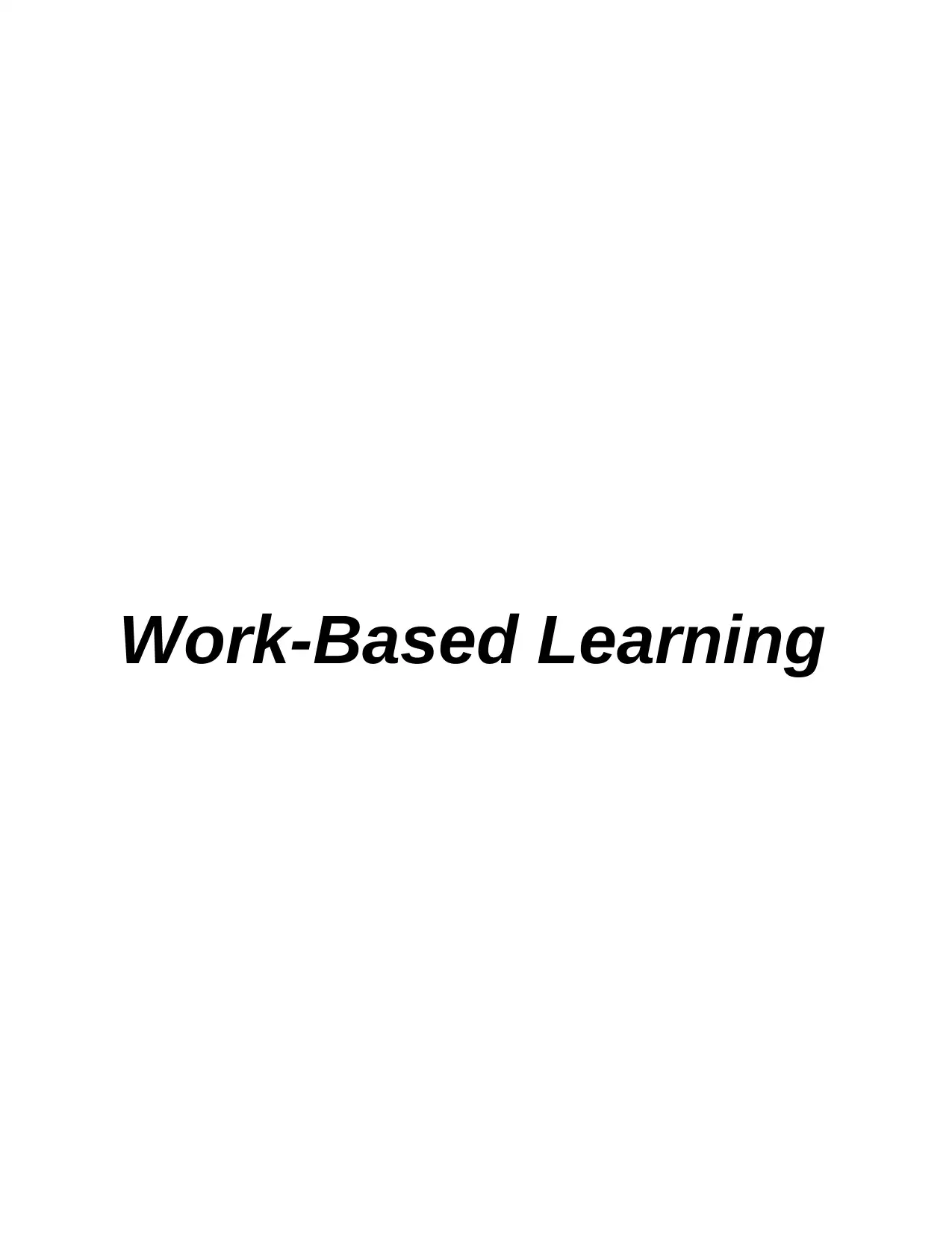
Work-Based Learning
Secure Best Marks with AI Grader
Need help grading? Try our AI Grader for instant feedback on your assignments.
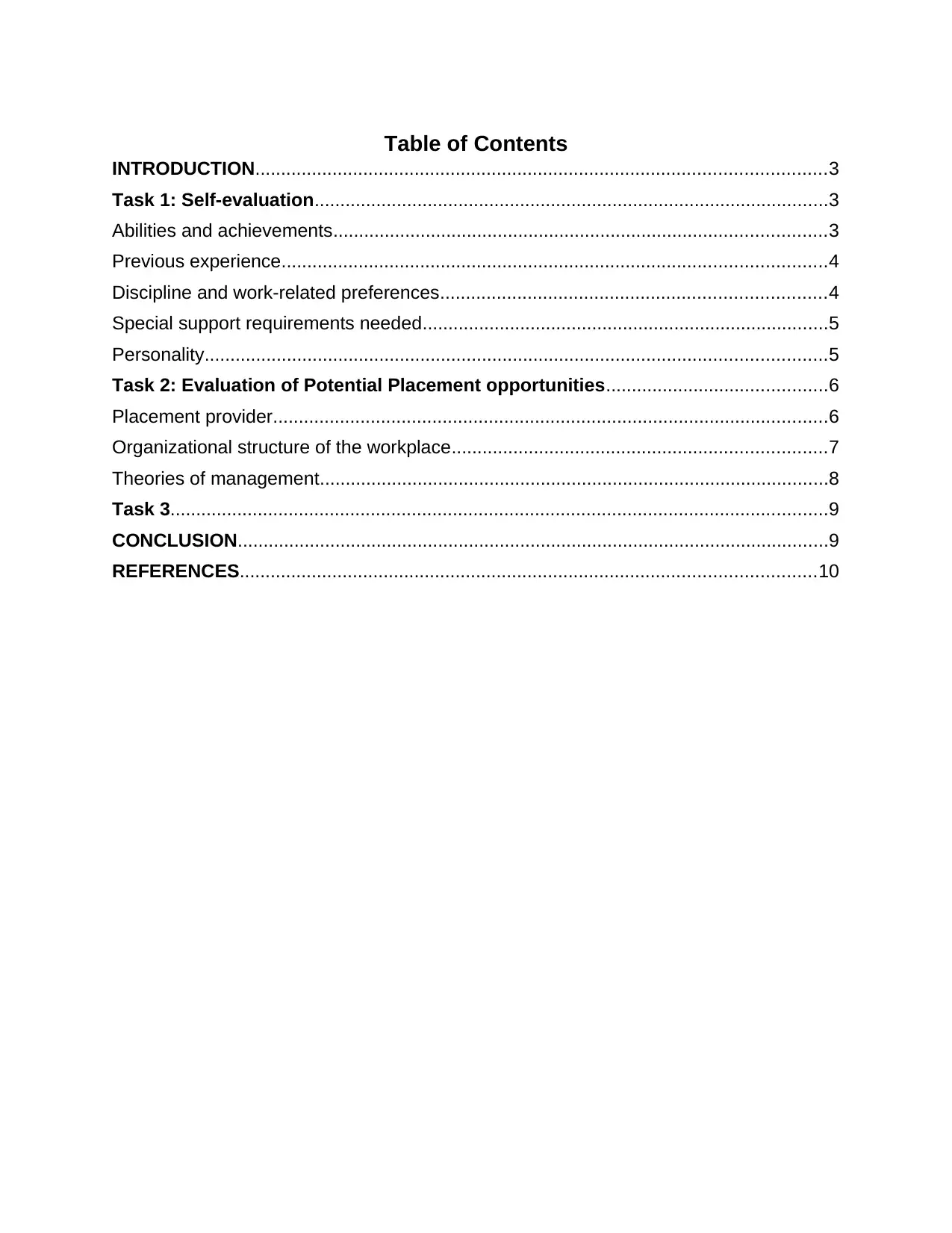
Table of Contents
INTRODUCTION...............................................................................................................3
Task 1: Self-evaluation....................................................................................................3
Abilities and achievements................................................................................................3
Previous experience..........................................................................................................4
Discipline and work-related preferences...........................................................................4
Special support requirements needed...............................................................................5
Personality.........................................................................................................................5
Task 2: Evaluation of Potential Placement opportunities...........................................6
Placement provider............................................................................................................6
Organizational structure of the workplace.........................................................................7
Theories of management...................................................................................................8
Task 3................................................................................................................................9
CONCLUSION...................................................................................................................9
REFERENCES................................................................................................................10
INTRODUCTION...............................................................................................................3
Task 1: Self-evaluation....................................................................................................3
Abilities and achievements................................................................................................3
Previous experience..........................................................................................................4
Discipline and work-related preferences...........................................................................4
Special support requirements needed...............................................................................5
Personality.........................................................................................................................5
Task 2: Evaluation of Potential Placement opportunities...........................................6
Placement provider............................................................................................................6
Organizational structure of the workplace.........................................................................7
Theories of management...................................................................................................8
Task 3................................................................................................................................9
CONCLUSION...................................................................................................................9
REFERENCES................................................................................................................10
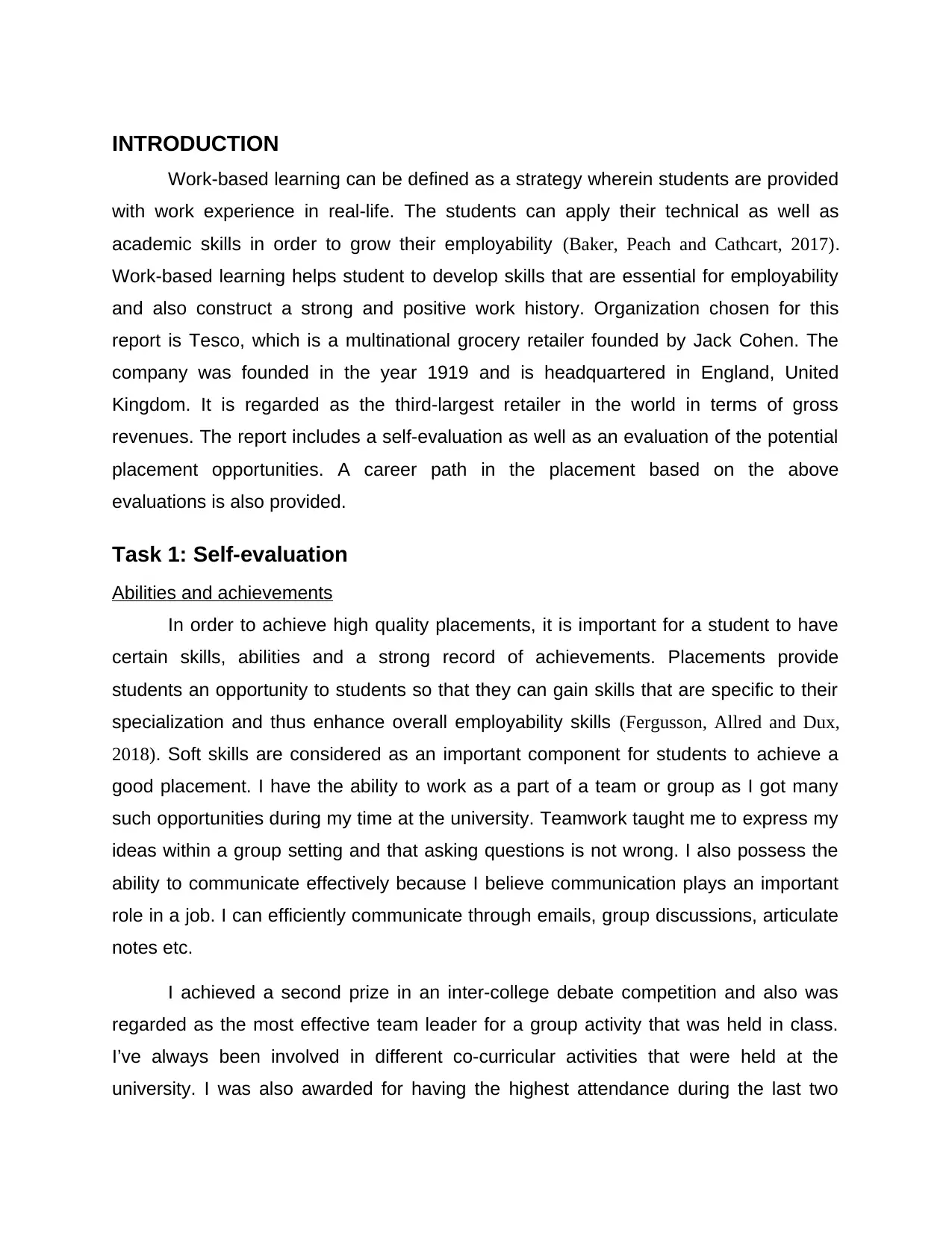
INTRODUCTION
Work-based learning can be defined as a strategy wherein students are provided
with work experience in real-life. The students can apply their technical as well as
academic skills in order to grow their employability (Baker, Peach and Cathcart, 2017).
Work-based learning helps student to develop skills that are essential for employability
and also construct a strong and positive work history. Organization chosen for this
report is Tesco, which is a multinational grocery retailer founded by Jack Cohen. The
company was founded in the year 1919 and is headquartered in England, United
Kingdom. It is regarded as the third-largest retailer in the world in terms of gross
revenues. The report includes a self-evaluation as well as an evaluation of the potential
placement opportunities. A career path in the placement based on the above
evaluations is also provided.
Task 1: Self-evaluation
Abilities and achievements
In order to achieve high quality placements, it is important for a student to have
certain skills, abilities and a strong record of achievements. Placements provide
students an opportunity to students so that they can gain skills that are specific to their
specialization and thus enhance overall employability skills (Fergusson, Allred and Dux,
2018). Soft skills are considered as an important component for students to achieve a
good placement. I have the ability to work as a part of a team or group as I got many
such opportunities during my time at the university. Teamwork taught me to express my
ideas within a group setting and that asking questions is not wrong. I also possess the
ability to communicate effectively because I believe communication plays an important
role in a job. I can efficiently communicate through emails, group discussions, articulate
notes etc.
I achieved a second prize in an inter-college debate competition and also was
regarded as the most effective team leader for a group activity that was held in class.
I’ve always been involved in different co-curricular activities that were held at the
university. I was also awarded for having the highest attendance during the last two
Work-based learning can be defined as a strategy wherein students are provided
with work experience in real-life. The students can apply their technical as well as
academic skills in order to grow their employability (Baker, Peach and Cathcart, 2017).
Work-based learning helps student to develop skills that are essential for employability
and also construct a strong and positive work history. Organization chosen for this
report is Tesco, which is a multinational grocery retailer founded by Jack Cohen. The
company was founded in the year 1919 and is headquartered in England, United
Kingdom. It is regarded as the third-largest retailer in the world in terms of gross
revenues. The report includes a self-evaluation as well as an evaluation of the potential
placement opportunities. A career path in the placement based on the above
evaluations is also provided.
Task 1: Self-evaluation
Abilities and achievements
In order to achieve high quality placements, it is important for a student to have
certain skills, abilities and a strong record of achievements. Placements provide
students an opportunity to students so that they can gain skills that are specific to their
specialization and thus enhance overall employability skills (Fergusson, Allred and Dux,
2018). Soft skills are considered as an important component for students to achieve a
good placement. I have the ability to work as a part of a team or group as I got many
such opportunities during my time at the university. Teamwork taught me to express my
ideas within a group setting and that asking questions is not wrong. I also possess the
ability to communicate effectively because I believe communication plays an important
role in a job. I can efficiently communicate through emails, group discussions, articulate
notes etc.
I achieved a second prize in an inter-college debate competition and also was
regarded as the most effective team leader for a group activity that was held in class.
I’ve always been involved in different co-curricular activities that were held at the
university. I was also awarded for having the highest attendance during the last two
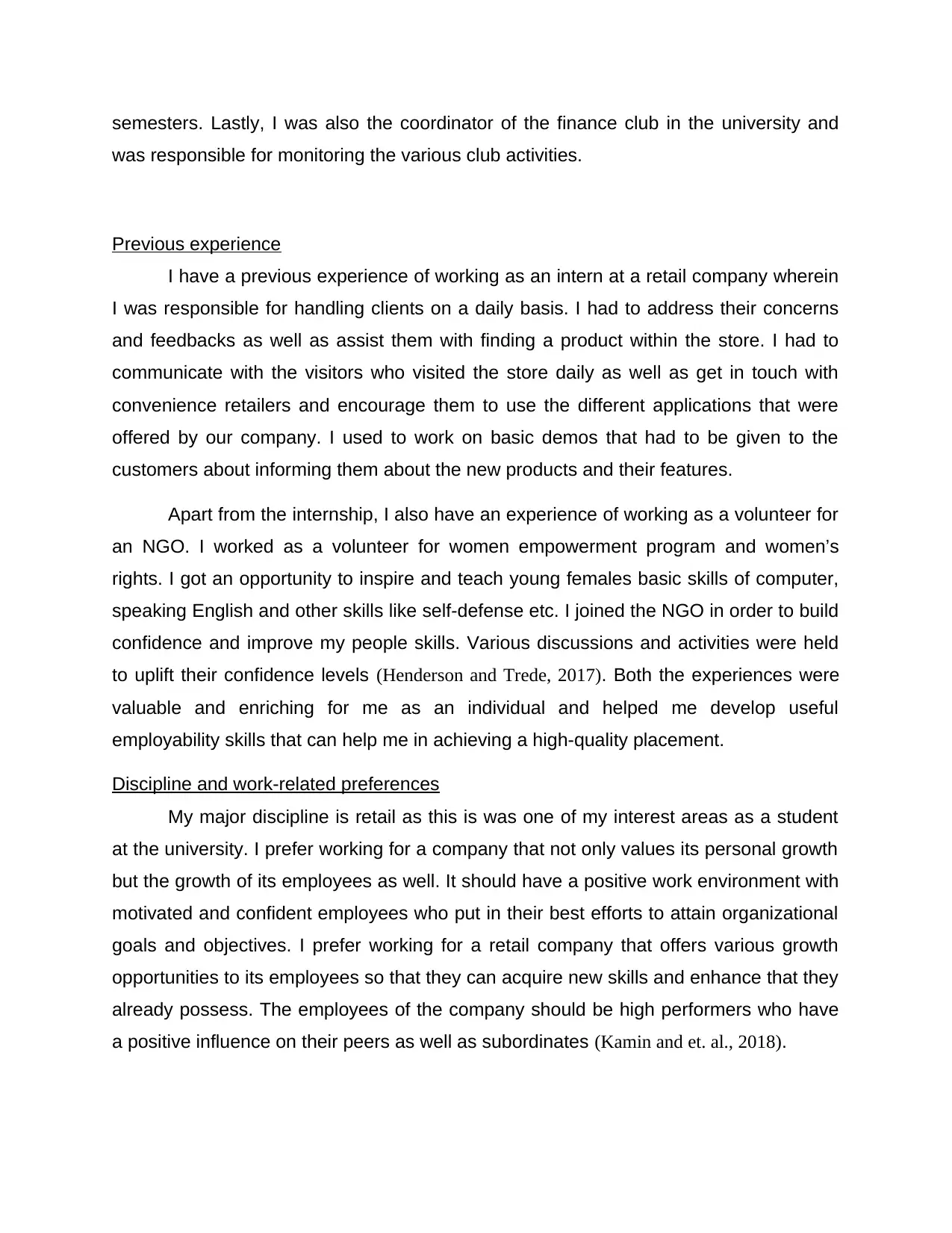
semesters. Lastly, I was also the coordinator of the finance club in the university and
was responsible for monitoring the various club activities.
Previous experience
I have a previous experience of working as an intern at a retail company wherein
I was responsible for handling clients on a daily basis. I had to address their concerns
and feedbacks as well as assist them with finding a product within the store. I had to
communicate with the visitors who visited the store daily as well as get in touch with
convenience retailers and encourage them to use the different applications that were
offered by our company. I used to work on basic demos that had to be given to the
customers about informing them about the new products and their features.
Apart from the internship, I also have an experience of working as a volunteer for
an NGO. I worked as a volunteer for women empowerment program and women’s
rights. I got an opportunity to inspire and teach young females basic skills of computer,
speaking English and other skills like self-defense etc. I joined the NGO in order to build
confidence and improve my people skills. Various discussions and activities were held
to uplift their confidence levels (Henderson and Trede, 2017). Both the experiences were
valuable and enriching for me as an individual and helped me develop useful
employability skills that can help me in achieving a high-quality placement.
Discipline and work-related preferences
My major discipline is retail as this is was one of my interest areas as a student
at the university. I prefer working for a company that not only values its personal growth
but the growth of its employees as well. It should have a positive work environment with
motivated and confident employees who put in their best efforts to attain organizational
goals and objectives. I prefer working for a retail company that offers various growth
opportunities to its employees so that they can acquire new skills and enhance that they
already possess. The employees of the company should be high performers who have
a positive influence on their peers as well as subordinates (Kamin and et. al., 2018).
was responsible for monitoring the various club activities.
Previous experience
I have a previous experience of working as an intern at a retail company wherein
I was responsible for handling clients on a daily basis. I had to address their concerns
and feedbacks as well as assist them with finding a product within the store. I had to
communicate with the visitors who visited the store daily as well as get in touch with
convenience retailers and encourage them to use the different applications that were
offered by our company. I used to work on basic demos that had to be given to the
customers about informing them about the new products and their features.
Apart from the internship, I also have an experience of working as a volunteer for
an NGO. I worked as a volunteer for women empowerment program and women’s
rights. I got an opportunity to inspire and teach young females basic skills of computer,
speaking English and other skills like self-defense etc. I joined the NGO in order to build
confidence and improve my people skills. Various discussions and activities were held
to uplift their confidence levels (Henderson and Trede, 2017). Both the experiences were
valuable and enriching for me as an individual and helped me develop useful
employability skills that can help me in achieving a high-quality placement.
Discipline and work-related preferences
My major discipline is retail as this is was one of my interest areas as a student
at the university. I prefer working for a company that not only values its personal growth
but the growth of its employees as well. It should have a positive work environment with
motivated and confident employees who put in their best efforts to attain organizational
goals and objectives. I prefer working for a retail company that offers various growth
opportunities to its employees so that they can acquire new skills and enhance that they
already possess. The employees of the company should be high performers who have
a positive influence on their peers as well as subordinates (Kamin and et. al., 2018).
Secure Best Marks with AI Grader
Need help grading? Try our AI Grader for instant feedback on your assignments.
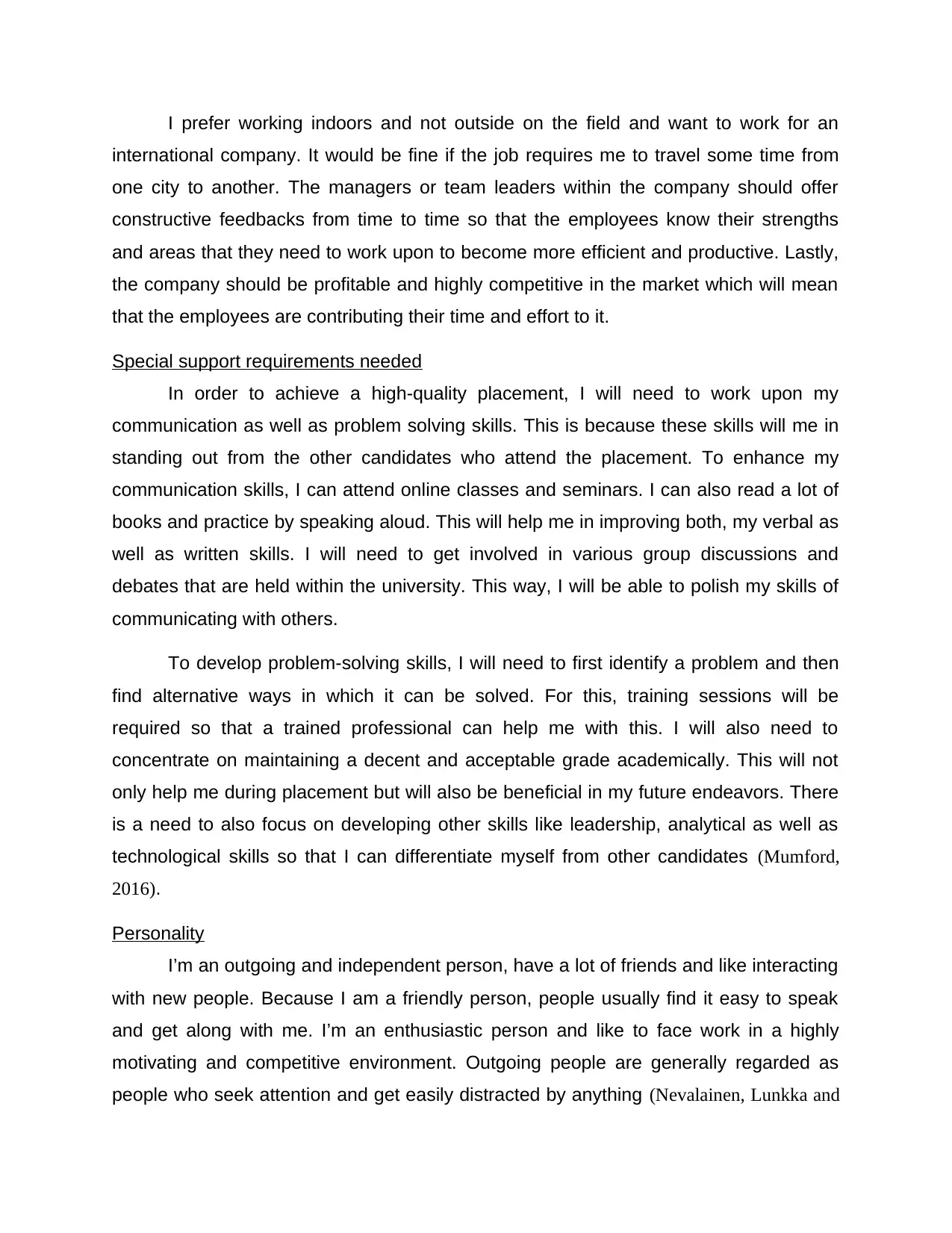
I prefer working indoors and not outside on the field and want to work for an
international company. It would be fine if the job requires me to travel some time from
one city to another. The managers or team leaders within the company should offer
constructive feedbacks from time to time so that the employees know their strengths
and areas that they need to work upon to become more efficient and productive. Lastly,
the company should be profitable and highly competitive in the market which will mean
that the employees are contributing their time and effort to it.
Special support requirements needed
In order to achieve a high-quality placement, I will need to work upon my
communication as well as problem solving skills. This is because these skills will me in
standing out from the other candidates who attend the placement. To enhance my
communication skills, I can attend online classes and seminars. I can also read a lot of
books and practice by speaking aloud. This will help me in improving both, my verbal as
well as written skills. I will need to get involved in various group discussions and
debates that are held within the university. This way, I will be able to polish my skills of
communicating with others.
To develop problem-solving skills, I will need to first identify a problem and then
find alternative ways in which it can be solved. For this, training sessions will be
required so that a trained professional can help me with this. I will also need to
concentrate on maintaining a decent and acceptable grade academically. This will not
only help me during placement but will also be beneficial in my future endeavors. There
is a need to also focus on developing other skills like leadership, analytical as well as
technological skills so that I can differentiate myself from other candidates (Mumford,
2016).
Personality
I’m an outgoing and independent person, have a lot of friends and like interacting
with new people. Because I am a friendly person, people usually find it easy to speak
and get along with me. I’m an enthusiastic person and like to face work in a highly
motivating and competitive environment. Outgoing people are generally regarded as
people who seek attention and get easily distracted by anything (Nevalainen, Lunkka and
international company. It would be fine if the job requires me to travel some time from
one city to another. The managers or team leaders within the company should offer
constructive feedbacks from time to time so that the employees know their strengths
and areas that they need to work upon to become more efficient and productive. Lastly,
the company should be profitable and highly competitive in the market which will mean
that the employees are contributing their time and effort to it.
Special support requirements needed
In order to achieve a high-quality placement, I will need to work upon my
communication as well as problem solving skills. This is because these skills will me in
standing out from the other candidates who attend the placement. To enhance my
communication skills, I can attend online classes and seminars. I can also read a lot of
books and practice by speaking aloud. This will help me in improving both, my verbal as
well as written skills. I will need to get involved in various group discussions and
debates that are held within the university. This way, I will be able to polish my skills of
communicating with others.
To develop problem-solving skills, I will need to first identify a problem and then
find alternative ways in which it can be solved. For this, training sessions will be
required so that a trained professional can help me with this. I will also need to
concentrate on maintaining a decent and acceptable grade academically. This will not
only help me during placement but will also be beneficial in my future endeavors. There
is a need to also focus on developing other skills like leadership, analytical as well as
technological skills so that I can differentiate myself from other candidates (Mumford,
2016).
Personality
I’m an outgoing and independent person, have a lot of friends and like interacting
with new people. Because I am a friendly person, people usually find it easy to speak
and get along with me. I’m an enthusiastic person and like to face work in a highly
motivating and competitive environment. Outgoing people are generally regarded as
people who seek attention and get easily distracted by anything (Nevalainen, Lunkka and
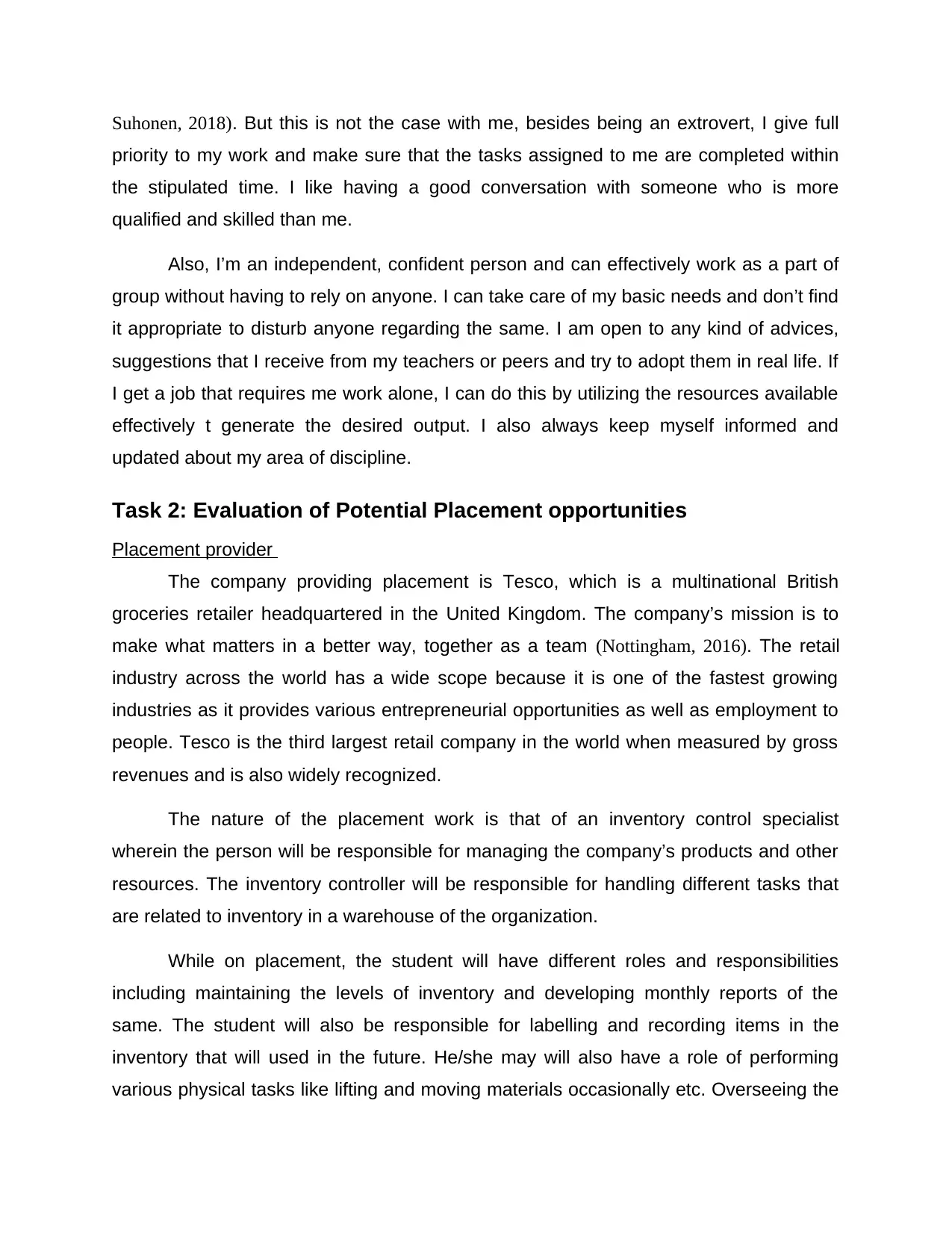
Suhonen, 2018). But this is not the case with me, besides being an extrovert, I give full
priority to my work and make sure that the tasks assigned to me are completed within
the stipulated time. I like having a good conversation with someone who is more
qualified and skilled than me.
Also, I’m an independent, confident person and can effectively work as a part of
group without having to rely on anyone. I can take care of my basic needs and don’t find
it appropriate to disturb anyone regarding the same. I am open to any kind of advices,
suggestions that I receive from my teachers or peers and try to adopt them in real life. If
I get a job that requires me work alone, I can do this by utilizing the resources available
effectively t generate the desired output. I also always keep myself informed and
updated about my area of discipline.
Task 2: Evaluation of Potential Placement opportunities
Placement provider
The company providing placement is Tesco, which is a multinational British
groceries retailer headquartered in the United Kingdom. The company’s mission is to
make what matters in a better way, together as a team (Nottingham, 2016). The retail
industry across the world has a wide scope because it is one of the fastest growing
industries as it provides various entrepreneurial opportunities as well as employment to
people. Tesco is the third largest retail company in the world when measured by gross
revenues and is also widely recognized.
The nature of the placement work is that of an inventory control specialist
wherein the person will be responsible for managing the company’s products and other
resources. The inventory controller will be responsible for handling different tasks that
are related to inventory in a warehouse of the organization.
While on placement, the student will have different roles and responsibilities
including maintaining the levels of inventory and developing monthly reports of the
same. The student will also be responsible for labelling and recording items in the
inventory that will used in the future. He/she may will also have a role of performing
various physical tasks like lifting and moving materials occasionally etc. Overseeing the
priority to my work and make sure that the tasks assigned to me are completed within
the stipulated time. I like having a good conversation with someone who is more
qualified and skilled than me.
Also, I’m an independent, confident person and can effectively work as a part of
group without having to rely on anyone. I can take care of my basic needs and don’t find
it appropriate to disturb anyone regarding the same. I am open to any kind of advices,
suggestions that I receive from my teachers or peers and try to adopt them in real life. If
I get a job that requires me work alone, I can do this by utilizing the resources available
effectively t generate the desired output. I also always keep myself informed and
updated about my area of discipline.
Task 2: Evaluation of Potential Placement opportunities
Placement provider
The company providing placement is Tesco, which is a multinational British
groceries retailer headquartered in the United Kingdom. The company’s mission is to
make what matters in a better way, together as a team (Nottingham, 2016). The retail
industry across the world has a wide scope because it is one of the fastest growing
industries as it provides various entrepreneurial opportunities as well as employment to
people. Tesco is the third largest retail company in the world when measured by gross
revenues and is also widely recognized.
The nature of the placement work is that of an inventory control specialist
wherein the person will be responsible for managing the company’s products and other
resources. The inventory controller will be responsible for handling different tasks that
are related to inventory in a warehouse of the organization.
While on placement, the student will have different roles and responsibilities
including maintaining the levels of inventory and developing monthly reports of the
same. The student will also be responsible for labelling and recording items in the
inventory that will used in the future. He/she may will also have a role of performing
various physical tasks like lifting and moving materials occasionally etc. Overseeing the
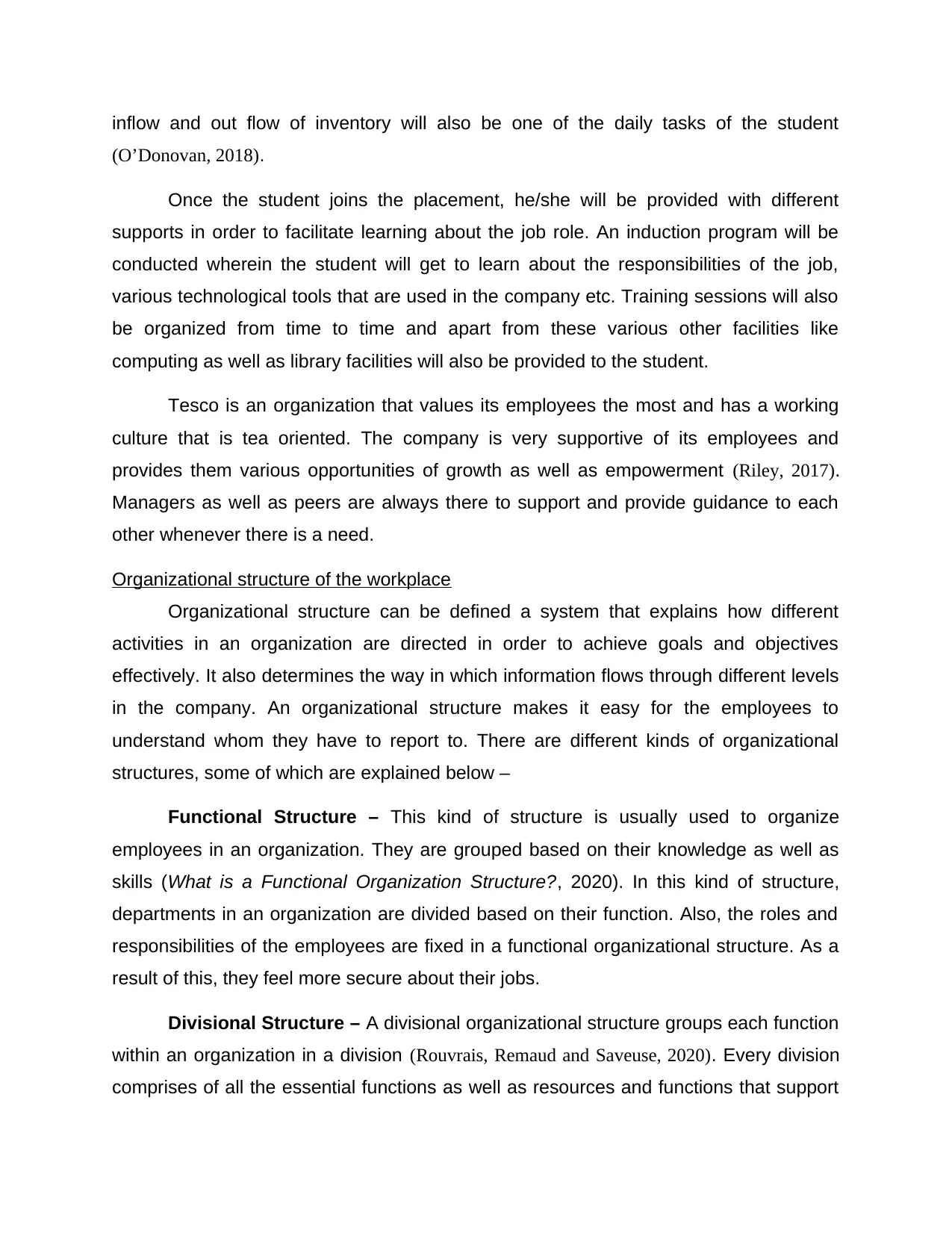
inflow and out flow of inventory will also be one of the daily tasks of the student
(O’Donovan, 2018).
Once the student joins the placement, he/she will be provided with different
supports in order to facilitate learning about the job role. An induction program will be
conducted wherein the student will get to learn about the responsibilities of the job,
various technological tools that are used in the company etc. Training sessions will also
be organized from time to time and apart from these various other facilities like
computing as well as library facilities will also be provided to the student.
Tesco is an organization that values its employees the most and has a working
culture that is tea oriented. The company is very supportive of its employees and
provides them various opportunities of growth as well as empowerment (Riley, 2017).
Managers as well as peers are always there to support and provide guidance to each
other whenever there is a need.
Organizational structure of the workplace
Organizational structure can be defined a system that explains how different
activities in an organization are directed in order to achieve goals and objectives
effectively. It also determines the way in which information flows through different levels
in the company. An organizational structure makes it easy for the employees to
understand whom they have to report to. There are different kinds of organizational
structures, some of which are explained below –
Functional Structure – This kind of structure is usually used to organize
employees in an organization. They are grouped based on their knowledge as well as
skills (What is a Functional Organization Structure?, 2020). In this kind of structure,
departments in an organization are divided based on their function. Also, the roles and
responsibilities of the employees are fixed in a functional organizational structure. As a
result of this, they feel more secure about their jobs.
Divisional Structure – A divisional organizational structure groups each function
within an organization in a division (Rouvrais, Remaud and Saveuse, 2020). Every division
comprises of all the essential functions as well as resources and functions that support
(O’Donovan, 2018).
Once the student joins the placement, he/she will be provided with different
supports in order to facilitate learning about the job role. An induction program will be
conducted wherein the student will get to learn about the responsibilities of the job,
various technological tools that are used in the company etc. Training sessions will also
be organized from time to time and apart from these various other facilities like
computing as well as library facilities will also be provided to the student.
Tesco is an organization that values its employees the most and has a working
culture that is tea oriented. The company is very supportive of its employees and
provides them various opportunities of growth as well as empowerment (Riley, 2017).
Managers as well as peers are always there to support and provide guidance to each
other whenever there is a need.
Organizational structure of the workplace
Organizational structure can be defined a system that explains how different
activities in an organization are directed in order to achieve goals and objectives
effectively. It also determines the way in which information flows through different levels
in the company. An organizational structure makes it easy for the employees to
understand whom they have to report to. There are different kinds of organizational
structures, some of which are explained below –
Functional Structure – This kind of structure is usually used to organize
employees in an organization. They are grouped based on their knowledge as well as
skills (What is a Functional Organization Structure?, 2020). In this kind of structure,
departments in an organization are divided based on their function. Also, the roles and
responsibilities of the employees are fixed in a functional organizational structure. As a
result of this, they feel more secure about their jobs.
Divisional Structure – A divisional organizational structure groups each function
within an organization in a division (Rouvrais, Remaud and Saveuse, 2020). Every division
comprises of all the essential functions as well as resources and functions that support
Paraphrase This Document
Need a fresh take? Get an instant paraphrase of this document with our AI Paraphraser
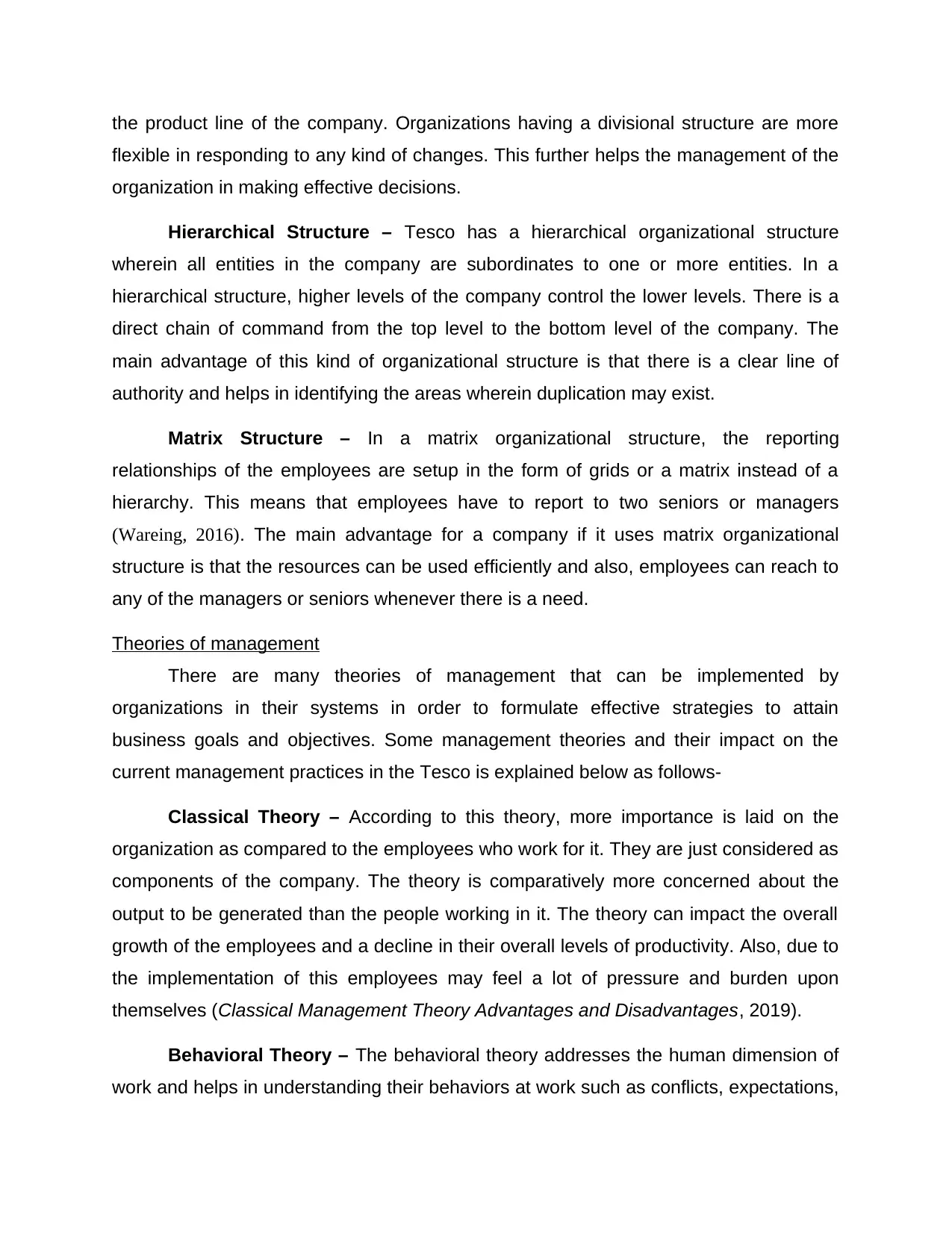
the product line of the company. Organizations having a divisional structure are more
flexible in responding to any kind of changes. This further helps the management of the
organization in making effective decisions.
Hierarchical Structure – Tesco has a hierarchical organizational structure
wherein all entities in the company are subordinates to one or more entities. In a
hierarchical structure, higher levels of the company control the lower levels. There is a
direct chain of command from the top level to the bottom level of the company. The
main advantage of this kind of organizational structure is that there is a clear line of
authority and helps in identifying the areas wherein duplication may exist.
Matrix Structure – In a matrix organizational structure, the reporting
relationships of the employees are setup in the form of grids or a matrix instead of a
hierarchy. This means that employees have to report to two seniors or managers
(Wareing, 2016). The main advantage for a company if it uses matrix organizational
structure is that the resources can be used efficiently and also, employees can reach to
any of the managers or seniors whenever there is a need.
Theories of management
There are many theories of management that can be implemented by
organizations in their systems in order to formulate effective strategies to attain
business goals and objectives. Some management theories and their impact on the
current management practices in the Tesco is explained below as follows-
Classical Theory – According to this theory, more importance is laid on the
organization as compared to the employees who work for it. They are just considered as
components of the company. The theory is comparatively more concerned about the
output to be generated than the people working in it. The theory can impact the overall
growth of the employees and a decline in their overall levels of productivity. Also, due to
the implementation of this employees may feel a lot of pressure and burden upon
themselves (Classical Management Theory Advantages and Disadvantages, 2019).
Behavioral Theory – The behavioral theory addresses the human dimension of
work and helps in understanding their behaviors at work such as conflicts, expectations,
flexible in responding to any kind of changes. This further helps the management of the
organization in making effective decisions.
Hierarchical Structure – Tesco has a hierarchical organizational structure
wherein all entities in the company are subordinates to one or more entities. In a
hierarchical structure, higher levels of the company control the lower levels. There is a
direct chain of command from the top level to the bottom level of the company. The
main advantage of this kind of organizational structure is that there is a clear line of
authority and helps in identifying the areas wherein duplication may exist.
Matrix Structure – In a matrix organizational structure, the reporting
relationships of the employees are setup in the form of grids or a matrix instead of a
hierarchy. This means that employees have to report to two seniors or managers
(Wareing, 2016). The main advantage for a company if it uses matrix organizational
structure is that the resources can be used efficiently and also, employees can reach to
any of the managers or seniors whenever there is a need.
Theories of management
There are many theories of management that can be implemented by
organizations in their systems in order to formulate effective strategies to attain
business goals and objectives. Some management theories and their impact on the
current management practices in the Tesco is explained below as follows-
Classical Theory – According to this theory, more importance is laid on the
organization as compared to the employees who work for it. They are just considered as
components of the company. The theory is comparatively more concerned about the
output to be generated than the people working in it. The theory can impact the overall
growth of the employees and a decline in their overall levels of productivity. Also, due to
the implementation of this employees may feel a lot of pressure and burden upon
themselves (Classical Management Theory Advantages and Disadvantages, 2019).
Behavioral Theory – The behavioral theory addresses the human dimension of
work and helps in understanding their behaviors at work such as conflicts, expectations,
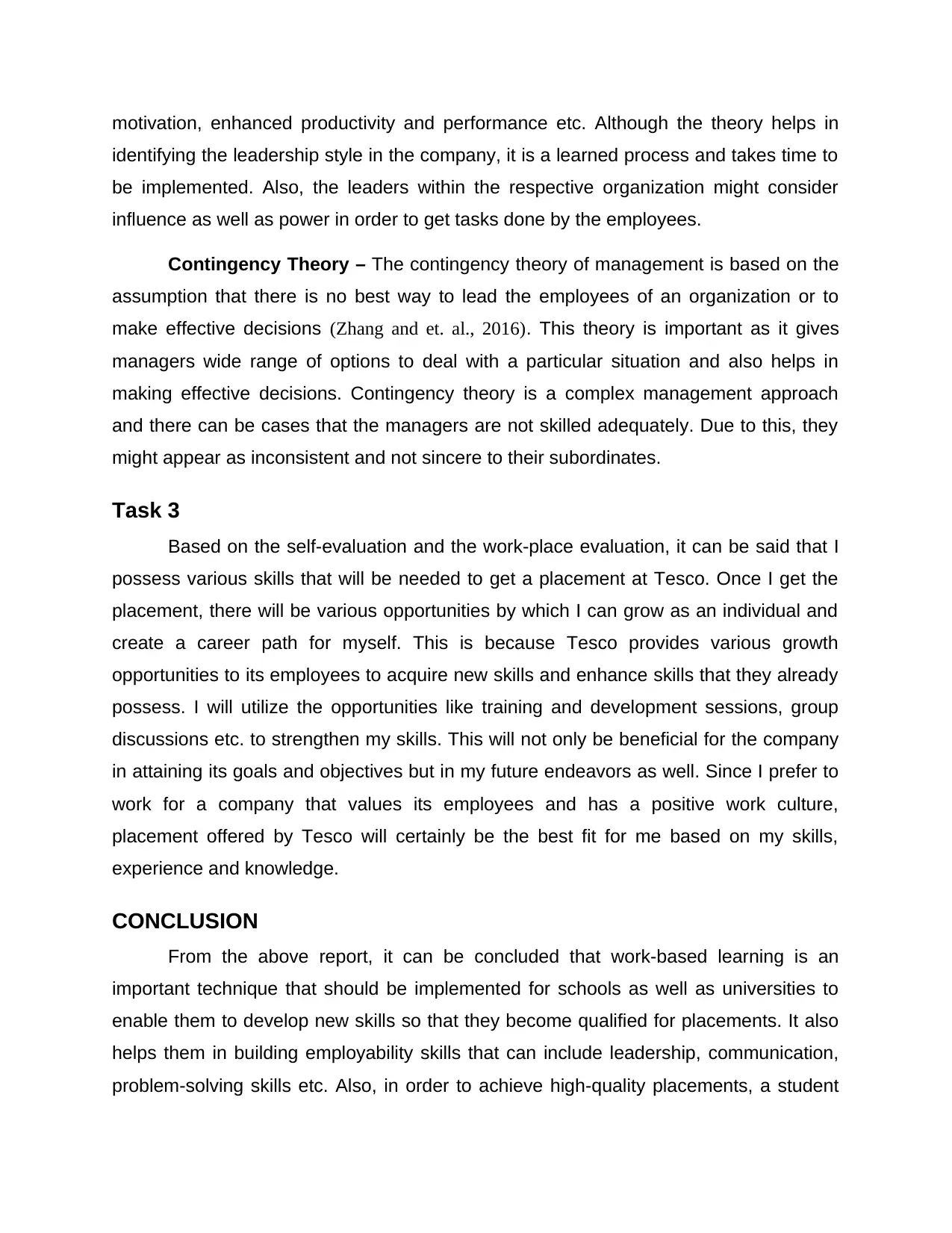
motivation, enhanced productivity and performance etc. Although the theory helps in
identifying the leadership style in the company, it is a learned process and takes time to
be implemented. Also, the leaders within the respective organization might consider
influence as well as power in order to get tasks done by the employees.
Contingency Theory – The contingency theory of management is based on the
assumption that there is no best way to lead the employees of an organization or to
make effective decisions (Zhang and et. al., 2016). This theory is important as it gives
managers wide range of options to deal with a particular situation and also helps in
making effective decisions. Contingency theory is a complex management approach
and there can be cases that the managers are not skilled adequately. Due to this, they
might appear as inconsistent and not sincere to their subordinates.
Task 3
Based on the self-evaluation and the work-place evaluation, it can be said that I
possess various skills that will be needed to get a placement at Tesco. Once I get the
placement, there will be various opportunities by which I can grow as an individual and
create a career path for myself. This is because Tesco provides various growth
opportunities to its employees to acquire new skills and enhance skills that they already
possess. I will utilize the opportunities like training and development sessions, group
discussions etc. to strengthen my skills. This will not only be beneficial for the company
in attaining its goals and objectives but in my future endeavors as well. Since I prefer to
work for a company that values its employees and has a positive work culture,
placement offered by Tesco will certainly be the best fit for me based on my skills,
experience and knowledge.
CONCLUSION
From the above report, it can be concluded that work-based learning is an
important technique that should be implemented for schools as well as universities to
enable them to develop new skills so that they become qualified for placements. It also
helps them in building employability skills that can include leadership, communication,
problem-solving skills etc. Also, in order to achieve high-quality placements, a student
identifying the leadership style in the company, it is a learned process and takes time to
be implemented. Also, the leaders within the respective organization might consider
influence as well as power in order to get tasks done by the employees.
Contingency Theory – The contingency theory of management is based on the
assumption that there is no best way to lead the employees of an organization or to
make effective decisions (Zhang and et. al., 2016). This theory is important as it gives
managers wide range of options to deal with a particular situation and also helps in
making effective decisions. Contingency theory is a complex management approach
and there can be cases that the managers are not skilled adequately. Due to this, they
might appear as inconsistent and not sincere to their subordinates.
Task 3
Based on the self-evaluation and the work-place evaluation, it can be said that I
possess various skills that will be needed to get a placement at Tesco. Once I get the
placement, there will be various opportunities by which I can grow as an individual and
create a career path for myself. This is because Tesco provides various growth
opportunities to its employees to acquire new skills and enhance skills that they already
possess. I will utilize the opportunities like training and development sessions, group
discussions etc. to strengthen my skills. This will not only be beneficial for the company
in attaining its goals and objectives but in my future endeavors as well. Since I prefer to
work for a company that values its employees and has a positive work culture,
placement offered by Tesco will certainly be the best fit for me based on my skills,
experience and knowledge.
CONCLUSION
From the above report, it can be concluded that work-based learning is an
important technique that should be implemented for schools as well as universities to
enable them to develop new skills so that they become qualified for placements. It also
helps them in building employability skills that can include leadership, communication,
problem-solving skills etc. Also, in order to achieve high-quality placements, a student

needs to various abilities and also, should have a past experience of work or internship.
Personality type also affects the kind of job role that the student would be a right fit for.
Personality type also affects the kind of job role that the student would be a right fit for.
Secure Best Marks with AI Grader
Need help grading? Try our AI Grader for instant feedback on your assignments.
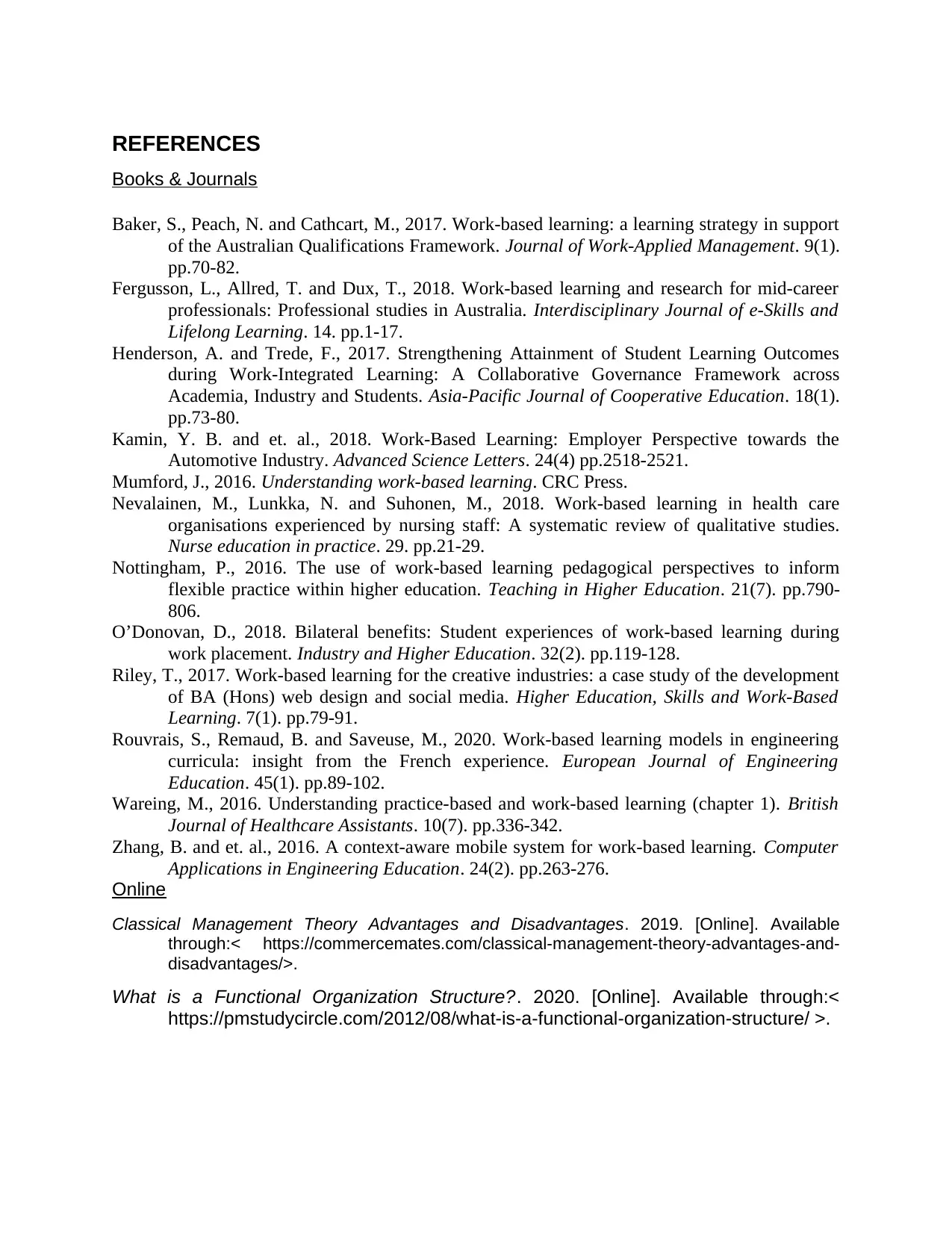
REFERENCES
Books & Journals
Baker, S., Peach, N. and Cathcart, M., 2017. Work-based learning: a learning strategy in support
of the Australian Qualifications Framework. Journal of Work-Applied Management. 9(1).
pp.70-82.
Fergusson, L., Allred, T. and Dux, T., 2018. Work-based learning and research for mid-career
professionals: Professional studies in Australia. Interdisciplinary Journal of e-Skills and
Lifelong Learning. 14. pp.1-17.
Henderson, A. and Trede, F., 2017. Strengthening Attainment of Student Learning Outcomes
during Work-Integrated Learning: A Collaborative Governance Framework across
Academia, Industry and Students. Asia-Pacific Journal of Cooperative Education. 18(1).
pp.73-80.
Kamin, Y. B. and et. al., 2018. Work-Based Learning: Employer Perspective towards the
Automotive Industry. Advanced Science Letters. 24(4) pp.2518-2521.
Mumford, J., 2016. Understanding work-based learning. CRC Press.
Nevalainen, M., Lunkka, N. and Suhonen, M., 2018. Work-based learning in health care
organisations experienced by nursing staff: A systematic review of qualitative studies.
Nurse education in practice. 29. pp.21-29.
Nottingham, P., 2016. The use of work-based learning pedagogical perspectives to inform
flexible practice within higher education. Teaching in Higher Education. 21(7). pp.790-
806.
O’Donovan, D., 2018. Bilateral benefits: Student experiences of work-based learning during
work placement. Industry and Higher Education. 32(2). pp.119-128.
Riley, T., 2017. Work-based learning for the creative industries: a case study of the development
of BA (Hons) web design and social media. Higher Education, Skills and Work-Based
Learning. 7(1). pp.79-91.
Rouvrais, S., Remaud, B. and Saveuse, M., 2020. Work-based learning models in engineering
curricula: insight from the French experience. European Journal of Engineering
Education. 45(1). pp.89-102.
Wareing, M., 2016. Understanding practice-based and work-based learning (chapter 1). British
Journal of Healthcare Assistants. 10(7). pp.336-342.
Zhang, B. and et. al., 2016. A context‐aware mobile system for work‐based learning. Computer
Applications in Engineering Education. 24(2). pp.263-276.
Online
Classical Management Theory Advantages and Disadvantages. 2019. [Online]. Available
through:< https://commercemates.com/classical-management-theory-advantages-and-
disadvantages/>.
What is a Functional Organization Structure?. 2020. [Online]. Available through:<
https://pmstudycircle.com/2012/08/what-is-a-functional-organization-structure/ >.
Books & Journals
Baker, S., Peach, N. and Cathcart, M., 2017. Work-based learning: a learning strategy in support
of the Australian Qualifications Framework. Journal of Work-Applied Management. 9(1).
pp.70-82.
Fergusson, L., Allred, T. and Dux, T., 2018. Work-based learning and research for mid-career
professionals: Professional studies in Australia. Interdisciplinary Journal of e-Skills and
Lifelong Learning. 14. pp.1-17.
Henderson, A. and Trede, F., 2017. Strengthening Attainment of Student Learning Outcomes
during Work-Integrated Learning: A Collaborative Governance Framework across
Academia, Industry and Students. Asia-Pacific Journal of Cooperative Education. 18(1).
pp.73-80.
Kamin, Y. B. and et. al., 2018. Work-Based Learning: Employer Perspective towards the
Automotive Industry. Advanced Science Letters. 24(4) pp.2518-2521.
Mumford, J., 2016. Understanding work-based learning. CRC Press.
Nevalainen, M., Lunkka, N. and Suhonen, M., 2018. Work-based learning in health care
organisations experienced by nursing staff: A systematic review of qualitative studies.
Nurse education in practice. 29. pp.21-29.
Nottingham, P., 2016. The use of work-based learning pedagogical perspectives to inform
flexible practice within higher education. Teaching in Higher Education. 21(7). pp.790-
806.
O’Donovan, D., 2018. Bilateral benefits: Student experiences of work-based learning during
work placement. Industry and Higher Education. 32(2). pp.119-128.
Riley, T., 2017. Work-based learning for the creative industries: a case study of the development
of BA (Hons) web design and social media. Higher Education, Skills and Work-Based
Learning. 7(1). pp.79-91.
Rouvrais, S., Remaud, B. and Saveuse, M., 2020. Work-based learning models in engineering
curricula: insight from the French experience. European Journal of Engineering
Education. 45(1). pp.89-102.
Wareing, M., 2016. Understanding practice-based and work-based learning (chapter 1). British
Journal of Healthcare Assistants. 10(7). pp.336-342.
Zhang, B. and et. al., 2016. A context‐aware mobile system for work‐based learning. Computer
Applications in Engineering Education. 24(2). pp.263-276.
Online
Classical Management Theory Advantages and Disadvantages. 2019. [Online]. Available
through:< https://commercemates.com/classical-management-theory-advantages-and-
disadvantages/>.
What is a Functional Organization Structure?. 2020. [Online]. Available through:<
https://pmstudycircle.com/2012/08/what-is-a-functional-organization-structure/ >.
1 out of 11
Related Documents
Your All-in-One AI-Powered Toolkit for Academic Success.
+13062052269
info@desklib.com
Available 24*7 on WhatsApp / Email
![[object Object]](/_next/static/media/star-bottom.7253800d.svg)
Unlock your academic potential
© 2024 | Zucol Services PVT LTD | All rights reserved.




